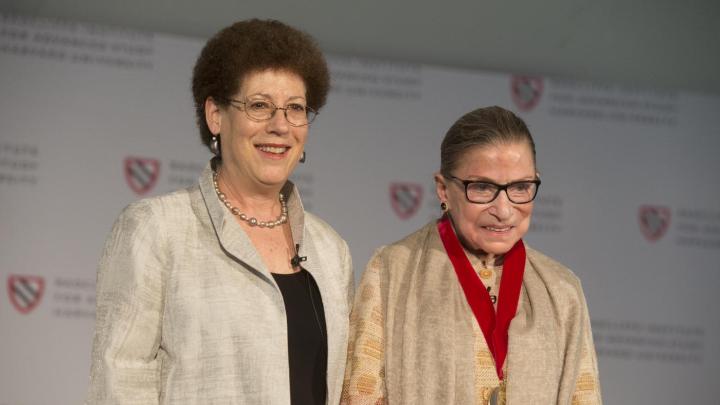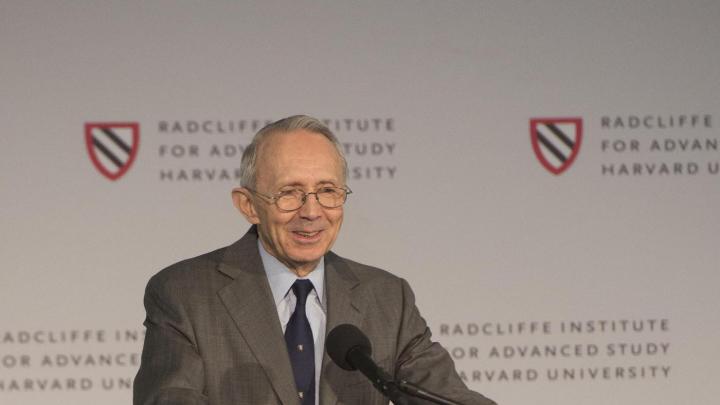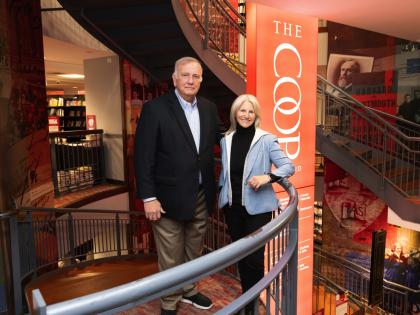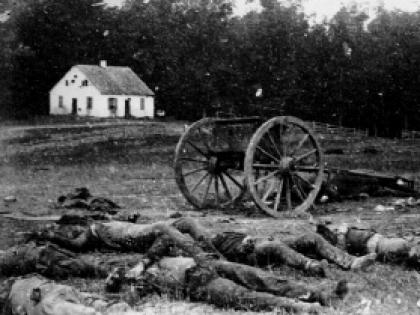When associate justice of the U.S. Supreme Court Ruth Bader Ginsburg, L ’59, LL.D. ’11, enrolled at Harvard Law School in the mid 1950s, she was one of just nine women in her class. Only a handful of women had served as federal judges in the nation by that time; 10 years later, women still accounted for barely 1 percent of Supreme Court litigators, and less than 2 percent of the faculty at the nation’s law schools. As late as 1979—two years before Sandra Day O’Connor’s precedent-breaking appointment to the Court—a behind-the-scenes book about that institution could be titled, accurately, The Brethren. As Kathleen M. Sullivan, J.D. ’81, told Ginsburg in front of an enthusiastic Radcliffe Day crowd on Friday: “There isn’t a glass ceiling you haven’t broken.”
Ginsburg, the recipient of the 2015 Radcliffe Medal, has been a fierce promoter of understanding women’s rights as a constitutional principle from the earliest stages in her career. She created a course on women and the law as a young faculty member at Rutgers Law School in the 1960s; co-founded the Women’s Rights Project at the American Civil Liberties Union (ACLU) in 1973; and, since 1993, has served as the second-ever woman justice on the nation’s highest court. Before presenting Ginsburg with her medal on Friday afternoon, dean of the Radcliffe Institute for Advanced Study Lizabeth Cohen lauded her “lifetime of brilliant service” as, in the words of the award’s official citation, “a passionate advocate for equality, and a dispassionate jurist for justice.”
Throughout the day, speakers—including Ginsburg herself—interwove her own history as a pioneering female lawyer and jurist with the ways she has influenced how women are treated under the law. At the end of a morning panel on the Court under Chief Justice John G. Roberts ’76, J.D. ’79, Kirkland & Ellis professor of law Michael Klarman spoke of the hurdles Ginsburg faced early in her career, when many saw her merely as a woman and mother, not as a lawyer, too. Klarman, who clerked for Ginsburg during her tenure on the Court of Appeals for the D.C. Circuit, explained how the very systems of stereotypes and discrimination she was trying to dismantle often interfered with her work. Thus, he said, even though in the 1970s she was a tenured professor at Columbia Law School and a Supreme Court litigator, she couldn’t convince her 10-year-old son’s school to call her husband at least some of the time when they wanted to discuss classroom misbehavior.
Twenty years later, though, she had little difficulty convincing her new Supreme Court colleagues about the seriousness of her work and intellect. At the Radcliffe luncheon, David H. Souter ’61, LL.B. ’66, LL.D. ’10—a retired associate justice who spent more than 15 years on the Court with Ginsburg—recalled the strong first impression she made during her first days at the Court. As the most junior of justices quickly took control of the questioning during her very first oral argument, Souter remembered associate justice Antonin Scalia, LL.B. ’60, leaning over and remarking, “You and I may have asked our last questions.” And Souter added that when he looked back recently at his notes from that first week, he found a simple statement: “I can’t reserve caution in my delight with Ruth.”
After one of several cheering, standing ovations that she received throughout the day, Ginsburg then took the stage in Radcliffe Yard with Sullivan, a former professor of law at Harvard and Stanford (where she served as dean) and a current partner at the firm Quinn Emanuel Urquhart & Sullivan, LLP. They began by discussing several of the major issues Ginsburg had tackled while at the ACLU, including cases that turned on questions of discrimination that seemed to privilege women—allowing them to forgo the hassle of jury duty, for example, or to receive benefits as a widow that a widower would have more difficulty obtaining. “The notion was that there were separate spheres for the sexes,” Ginsburg said. “What we were trying to accomplish was to get rid of all laws based on that stereotype, so people—women as well as men—could be, in the words of the song popular in the early Seventies, ‘Free to be you and me.’”
On several of these issues, Ginsburg achieved true justice only after she joined the high court. She gave the example of her failed attempts in the 1970s to open an elite, all-male public high school in Philadelphia to women; that effort, she reflected, came full circle in her 1996 majority opinion that opened the Virginia Military Institute to female cadets. As Klarman had noted earlier in the day, “Many social-reform activists do not live to see the day that their dreams are realized….Justice Ginsburg, of course, has not only lived to see the enormous changes in sex equality, but has helped to bring them about as a Supreme Court justice.”
Addressing the packed tent of Radcliffe alumnae and supporters, Ginsburg concluded with advice for those who have come after her. “Young women today have a great advantage: there are no more closed doors. That,” she reflected, “was basically what the Seventies were about—opening doors that had been closed to women….So my advice is fight for the things that you care about, but do it in a way that will lead others to join you. And the one vital asset is a sense of humor.”









